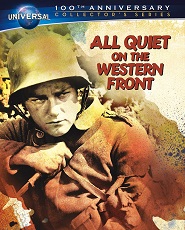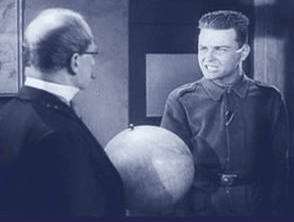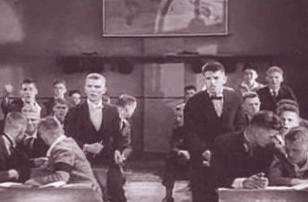
|
American Rhetoric: Movie Speech "All Quiet on the Western Front" (1930)
Paul Baumer Addresses Professor Kantorek's Class on the Harsh Realities of War
Audio mp3 delivered by Lewis Ayres
Professor Kantorek: From the farms they have gone, from the schools, from the factories. They have gone bravely, nobly, ever forward, realizing that there is no other duty now but to save the Fatherland.
Paul! How are you, Paul?! Professor Kantorek: You've come at the right moment, Baumer, just at the right moment. And as if to prove all I have said, here is one of the first to go, a lad who sat before me on these very benches, who gave up all to serve in the first year of the war. One of the iron youth who have made Germany invincible in the field. Look at him. Sturdy and bronze and clear-eyed. The kind of soldier every one of you should envy. Paul, lad, you must speak to them. You must tell them what it means to serve your Fatherland. Paul Baumer: No, no, I can't tell them anything. Professor Kantorek: You must, Paul. Just a word. Just tell them how much they're needed out there. Tell them why you went, what it meant to you. Paul Baumer: I can't say anything. Professor Kantorek: If you remember some deed of heroism, some touch of nobility, tell them about it. [The boys encourage Baumer to speak.] Paul Baumer: I can't tell you anything you don't know. We live in the trenches out there. We fight. We try not to be killed. Sometimes we are. That's all. Professor Kantorek: No, no, Paul. Paul Baumer: I've been there! I know what it's like. Professor Kantorek: That's not what one dwells on, Paul. Paul Baumer: I heard you in here reciting that same old stuff, making more iron men, more young heroes. You still think it's beautiful and sweet to die for your country, don't you? We used to think you knew. The first bombardment taught us better. It's dirty and painful to die for your country. When it comes to dying for your country, it's better not to die at all. There are millions out there dying for their countries. And what good is it?
Professor Kantorek: Paul!! Paul Baumer: You asked me to tell them how much they're needed out there. [To the boys] He tells you, "Go out and die." Oh, but if you'll pardon me, it's easier to say "go out and die" than it is to do it. One of the boys: Coward. Paul Baumer: And it's easier to say it than to watch it happen.
All the boys together (some rise to their feet): "You're a coward." Professor Kantorek: No! No! Boys! Boys! [To Paul] I'm sorry, Baumer, but I must say -- Paul Baumer: There's no use talking like this. You won't know what I mean. Only, it's been a long while since we enlisted out of this classroom. So long, I thought maybe the whole world had learned by this time. Only now, they're sending babies, and they won't last a week. I shouldn't have come on leave. Up at the front, you're alive or you're dead and that's all. And you can't fool anybody about that very long. And up there, we know we're lost and done for, whether we're dead or alive. Three years we've had of it. Four years. And every day a year, and every night a century. And our bodies are earth. And our thoughts are clay. And we sleep and eat with death. And we're done for, because you can't live that way and keep anything inside you. I shouldn't have come on leave. I'll go back tomorrow. I've got four days more, but I can't stand it here. I'll go back tomorrow. [To class] I'm sorry. |
|
© Copyright 2001-Present. |


